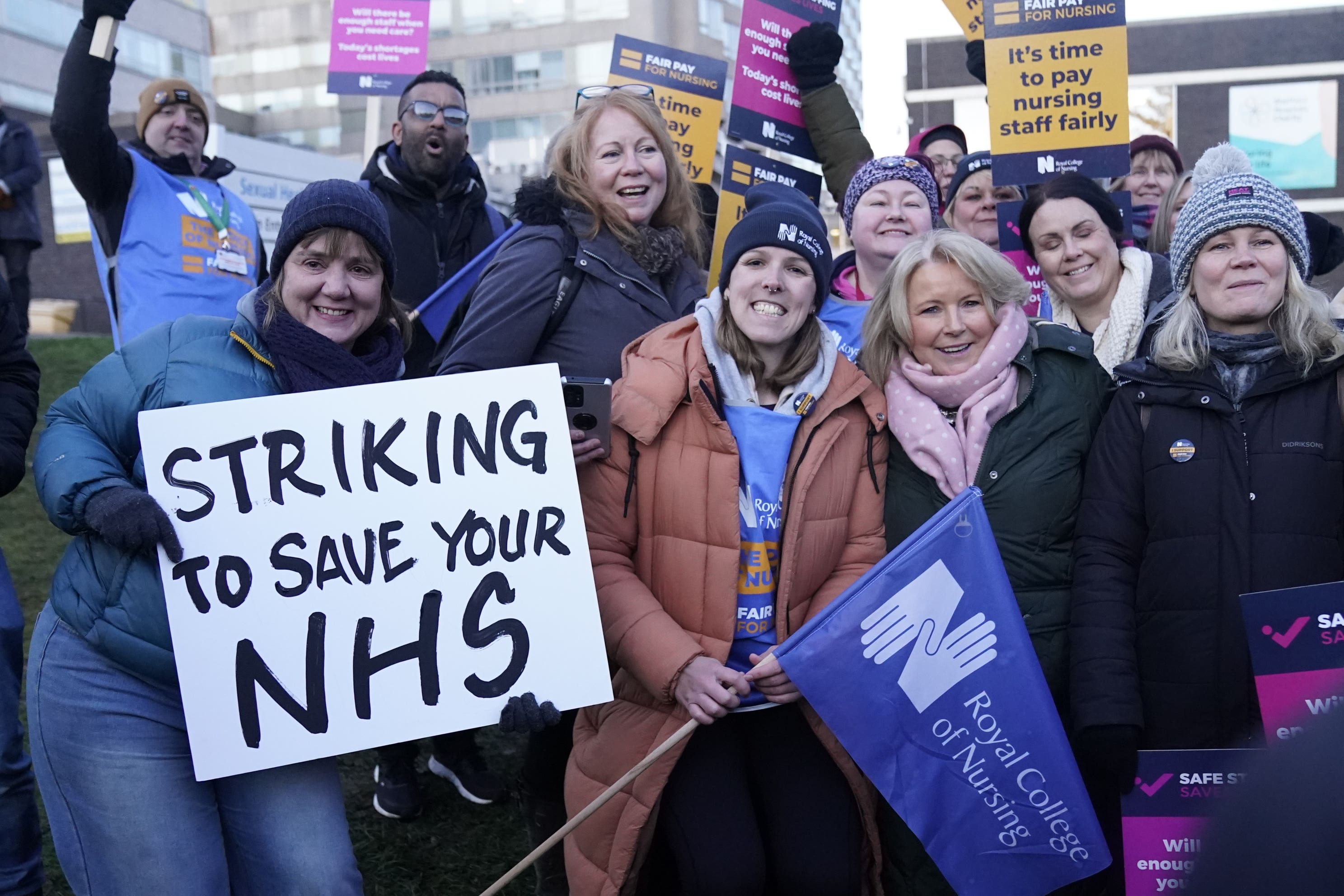Government faces years of strike action from nurses, warns RCN chief
Exclusive: NHS trust hospitals ‘insult’ nurses by offering triple rates to work during strikes this weekend, says the RCN’s chief

Your support helps us to tell the story
From reproductive rights to climate change to Big Tech, The Independent is on the ground when the story is developing. Whether it's investigating the financials of Elon Musk's pro-Trump PAC or producing our latest documentary, 'The A Word', which shines a light on the American women fighting for reproductive rights, we know how important it is to parse out the facts from the messaging.
At such a critical moment in US history, we need reporters on the ground. Your donation allows us to keep sending journalists to speak to both sides of the story.
The Independent is trusted by Americans across the entire political spectrum. And unlike many other quality news outlets, we choose not to lock Americans out of our reporting and analysis with paywalls. We believe quality journalism should be available to everyone, paid for by those who can afford it.
Your support makes all the difference.The UK could face years of strike action by nurses if the government does not change its strategy over pay, the general secretary of the Royal College of Nursing (RCN) has warned.
In an exclusive interview with The Independent, RCN chief Pat Cullen said the legal action undertaken against nurses this week by the government and the NHS had only served to “drive nurses further away”.
She said: “A few things that happened have left nursing staff feeling that their own employers, now, are turning their back on them.”
Her words come as tens of thousands of nurses are set to walk out on Sunday and Monday in the last round of strike action before the union reballots its members in May.
NHS trusts and the government have sent out strong warnings ahead of the bank holiday weekend, saying that patient safety is at risk as a consequence of nurses in emergency care, critical care and cancer care striking for the first time.
Speaking ahead of the strikes, Ms Cullen said nurses were receiving “endless” WhatsApp messages from hospital leaders offering them triple and quadruple their normal hourly rates to come into work rather than stand on the picket lines.
She said: “Those nurses looked at that and said it’s despicable. We’re only important on the day of the strike to pay [that rate]; we’re not important to pay any other day of the week ... So they felt that that was a major insult, not an incentive.”
The RCN said it is working with the NHS to put in place safety mitigations that can be enacted during the strike, and argued that the messaging over strikes was “disrespectful” and amounted to “emotionally blackmailing” nurses and patients.
Ms Cullen said the walkouts this year had shown that “the NHS is not able to cope without nursing staff”, adding that she hopes NHS leaders are signalling this to the government.
On Friday, the GMB Union voted in favour of a pay deal. This followed a yes vote by Unison last week. The results mean that the 14 health unions, who were negotiating collectively, are likely to have to accept the government’s 5.2 per cent pay offer, despite the RCN and other smaller unions voting against it.
Despite the setback, the RCN chief pledged to continue with plans for further industrial action, and said the union would further escalate its strikes if members voted to do so.

Before it can hold more strikes, the RCN will have to win a new ballot of its members, which it expects to launch in mid-May.
When asked if the government risked further strike action over the next five years if it failed to change its approach to pay, the nursing chief said: “If we have the same approach to pay negotiations next year, do we just grind the cycle again? Well, there is a strong possibility, because it appears that, for our nursing staff, that is the only way that they can get their voice heard.
“If [the government] take the same blinkered approach to addressing pay for nursing stuff, well, then we will find ourselves in the same position.”
‘Macho and draconian’
This week the RCN lost a High Court battle against health secretary Steve Barclay over its previous plan to end the strike at 8pm on 2 May – which would be eight hours after its legal mandate expired.
Ms Cullen said the court action had only served to drive a “greater wedge” between the government, the NHS as employers, and nurses.
She also criticised the “macho” and “draconian” tactics of Mr Barclay – and of Danny Mortimer, the chief executive of NHS Employers, which represents hospital trusts – in taking legal action.
“What sort of message is that to send? That is two very senior men and powerful men. They took very draconian decisions that impact and affect 90 per cent females,” she said.
The RCN chief also told ministers they had made a “fundamental mistake” in bringing the legal action against nurses ahead of the local elections, warning that voters would not forget it.



Join our commenting forum
Join thought-provoking conversations, follow other Independent readers and see their replies
Comments